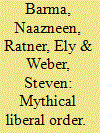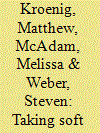| Srl | Item |
| 1 |
ID:
072029


|
|
|
| 2 |
ID:
075699


|
|
|
| 3 |
ID:
125092


|
|
|
|
|
| Publication |
2013.
|
| Summary/Abstract |
AFTER A year and a half of violence and tens of thousands of deaths in Syria, the UN Security Council convened in July 2012 to consider exerting additional international pressure on President Bashar al-Assad. And for the third time in nine months, Russia and China vetoed any moves toward multilateral intervention. Less than two weeks later, Kofi Annan resigned as the joint UN-Arab League special envoy for Syria, lamenting, "I can't want peace more than the protagonists, more than the Security Council or the international community for that matter."
|
|
|
|
|
|
|
|
|
|
|
|
|
|
|
|
| 4 |
ID:
101730


|
|
|
|
|
| Publication |
2010.
|
| Summary/Abstract |
The term soft power is entrenched in the theory and practice of American foreign policy, yet scholars have not yet developed, or empirically tested, a theory about the conditions under which governments can use soft power to their advantage-and that makes good policy hard to design. Drawing on research from the fields of communications, social psychology, and international relations theory, we develop a theory about the conditions under which state efforts to employ soft power will be most likely to succeed. We argue that to apply soft power effectively states must communicate to an intended target in a functioning marketplace of ideas, persuade the target to change its attitude on a relevant political issue, and ensure that the target's newly held attitude influences international political outcomes. We probe the plausibility of our theoretical claims through an examination of U.S. attempts to use soft power in the Iraq War, the war on terror, and democracy promotion. In conclusion, we set forth an agenda for future research on soft power and provide insights for policymakers interested in using soft power as a tool of foreign policy.
|
|
|
|
|
|
|
|
|
|
|
|
|
|
|
|
| 5 |
ID:
078042


|
|
|